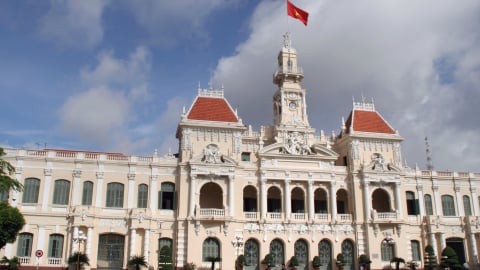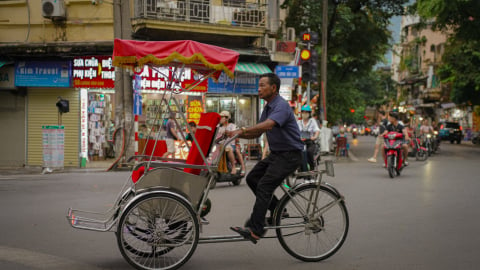The protests in Nepal have resulted not only in loss of life and property, but also in a severe blow to the tourism industry, considered the lifeblood of the country's economy. Even during what is considered peak tourist season, the number of visitors to Nepal has decreased by 30% compared to the same period last year, putting many businesses at risk of bankruptcy.
The wave of protests initiated by Generation Z stemmed from outrage over the government's ban on social media, coupled with corruption and the extravagant lifestyles of the elite in one of the world's poorest nations. These protests quickly escalated, leading to devastating consequences. At least 72 people were killed and over 2,000 injured in clashes. Images of the burning parliament building, presidential palace, and major hotels spread worldwide, creating a negative and unsettling impression.

Chaotic protests are taking place in Nepal.
This political and social instability has led many countries to issue travel advisories to Nepal. Although the situation has temporarily calmed down and businesses have resumed operations, once bustling areas like Thamel – the tourist hub of Kathmandu – remain deserted. Instead of crowded streets and bustling stalls, there is now only silence and the lingering smell of smoke. The sudden drop in tourist numbers has caused a crisis for local tourism businesses.

This situation significantly affects the lives of both locals and tourists visiting the area during this time.
For many small businesses in Nepal, from hotel and restaurant owners to trekking tour operators, this time of year is considered a "golden" period for generating revenue. September to December is the peak season when the weather is dry, ideal for exploration activities, especially trekking to base camps on Everest – the world's highest mountain. However, the recent chaos has completely shattered these expectations.

Many local businesses suffered significant consequences from this protest.
Ram Chandra Giri, 49, a trekking tour organizer and restaurant owner, couldn't hide his disappointment. "I'm sitting around doing nothing because there are no tourists. Many groups canceled their tours in September," he shared. He added that as many as 35% of bookings had been cancelled, an alarming number. Similarly, Renu Baniya, another hotel owner, shared that all rooms booked for the next month had been cancelled. These stories are not isolated incidents, but a common reality across the country.

Nepal welcomes approximately 1.2 million tourists annually, and the tourism industry contributes about 8% to its GDP. Currently, from September to December, it is considered the peak tourist season.
According to Deepak Raj Joshi, Director of the Nepal Tourism Board, the number of visitors has decreased by 30% compared to normal. He also added that in the past few days, the cancellation rate has been at 8-10%, a significant figure for the tourism industry. These figures speak volumes, reflecting the concerns of international tourists due to the instability and uncertainty in Nepal.
Nepal receives approximately 1.2 million tourists annually, and the tourism industry contributes about 8% to the country's GDP. This is a very large number, demonstrating the importance of tourism to the country's economic development. Therefore, a severe impact on the tourism industry is not only a loss of revenue but also a significant blow to the overall economy.

The situation in Nepal has gradually stabilized since the appointment of interim Prime Minister Sushila Karki. However, many areas in the capital Kathmandu still retain the smell of smoke, and residents are still working to clean up the aftermath.
Images of violent protests and burned buildings have spread widely in international media, creating a negative message. "Damage to government buildings and some hotels could send a negative message not only to tourists but also to investors," Joshi noted. This instability makes tourists wary and investors hesitant.
Although the Nepalese government has taken steps to stabilize the situation, including the appointment of interim Prime Minister Sushila Karki, stability remains uncertain. The election scheduled for March 5, 2026, is still a major unknown, preventing Nepal's political and social situation from fully returning to normal. In the heart of Kathmandu, many areas still linger with the smell of smoke, and people are still working to clean up the remnants of the protests.

Despite the difficulties, Nepalese officials and tourism businesses remain hopeful that tourists will return. However, they understand that trust needs to be rebuilt carefully. "We must be very honest in our communication. If the situation is not good, the tourism industry will never call on tourists to come," Mr. Joshi emphasized. This statement demonstrates the seriousness of the authorities in communicating and rebuilding the image of Nepal as a friendly and safe destination.
The fact that some foreign tourists chose to stay in Nepal has somewhat reinforced this belief. "Our families and friends called us to come home. But we never felt unsafe," shared Franz, a 55-year-old German tourist who was in Nepal during the protests. Franz's story is a bright spot, showing that Nepal can still be a safe destination for those who are willing to do their research.
Although the road ahead is still challenging, Nepal, with its majestic natural beauty and the hospitality of its people, can still hope for a revival. However, that revival will only be possible when political stability is established and the tourism industry rebuilds solid trust from the international community.

 VI
VI EN
EN


































